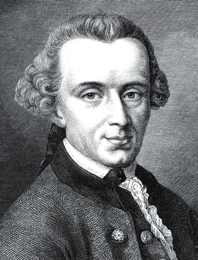3.3 Deontology
The basic premise of deontology, in contrast to consequentialist theories like utilitarianism, is that an action is moral if it conforms to certain principles or duties (irrespective of the consequences).
Deontology is derived from the Greek word deon, which means duty. The one name that stands out from all others in terms of this approach is that of Immanuel Kant.
The following extract from the Stanford Encyclopedia of Philosophy [Tip: hold Ctrl and click a link to open it in a new tab. (Hide tip)] provides a good summary of Kant's position:
Immanuel Kant (1724-1804) argued that the supreme principle of morality is a standard of rationality that he dubbed the "Categorical Imperative" (CI). Kant characterized the CI as an objective, rationally necessary and unconditional principle that we must always follow despite any natural desires or inclinations we may have to the contrary.
All specific moral requirements, according to Kant, are justified by this principle, which means that all immoral actions are irrational because they violate the CI. (Johnson and Cureton, 2018)
In layperson's terms, the Categorical Imperative can be compared and contrasted with what is often described as the Golden Rule, one that can be found in many different cultural and religious traditions: do unto others as you would want them do unto you.
It is immediately evident that this type of argument will provide solutions to ethical problems that are different from a utilitarian approach. In the shipwreck example we saw in Activity X it is no longer possible to justify killing someone, because the rule that can be deduced as universal is: do not kill.
Therefore, no matter what the consequences are, the morally correct answer would be not to kill anybody on the life-boat.
Activity 3.3 Turning knowledge to practice 
This activity is included in E4J Ethics Module 4 (Ethical leadership)
The idea behind this exercise is transfer knowledge about ethical leadership into practical guidelines. In Module 4, students are encouraged to examine ten activities which Daft (2011) associates with moral leadership and then to review the five principles of ethical leadership suggested by Northouse (2010).
After carefully considering the approaches of Northouse and Daft, students are encouraged to critically evaluate these approaches, and come up with their own set of practical guidelines for ethical leadership.
If you would like to read more about the subject, open this article on Deontology by philosopher Charles Freeland.
3.2 Utilitarianism

